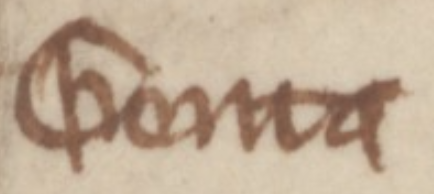Genta granddaughter of Genta
Referred to in records as: “Genta”, “Gente”, “Jenta”.
Brief biography

Genta was the daughter of Cresse (also called
Deulecresse) and his wife Avigaye, Jews of London.
Genta’s namesake was her paternal grandmother, an
apparently well-known Jewish woman of early thirteenth-century England who survives
almost exclusively through records of her son (almost
always identified matrilineally as son of Genta). The younger Genta was likely part
of
the London Jewish community, at least in her youth if not throughout her life, but
surviving records show her occupied with the Poyntz family of Somerset and Dorset.
An
interlocking series of cases show Genta collecting debt from tenants on William Poyntz’s
lands in Dorset. No other legal proceedings are connected to Genta, so it is unlikely
that she was primarily a financier. She may have been specially employed by William
Poyntz in some fashion, though he was also in debt to her. The difficulties started
when
he died, having long since defaulted on a 1251 loan of £10 between himself, Emma Oliver
(his heir and perhaps his wife), and Genta. Genta tried to recover her losses—now
at 25
marks (over £16)—by collecting from William’s estate. She first summoned the abbot
of
Hartland (Devon), tenant on the Poyntz lands, to answer for an outstanding debt of
100 shillings. By 1275, William’s heir Emma had sold or transferred her own liability
to
Joyce and Richard Lovel: Genta’s father wrote a starr releasing her of any debt to
Genta
held against Poyntz land in Blandford St Mary (Dorset).
By this time, Genta had married Sampson (sometimes called Samuel) son of Sampson.
In 1277, Genta and Sampson jointly sued Joyce and Richard. Genta was briefly imprisoned
in the Tower of London in June of that year, when she paid a fine for aid of some
sort.
Her arrest may have been related to the ongoing Poyntz inquiry, though many London
Jews were imprisoned that year. By the end of 1277, however, the Justices of the
Exchequer of Jews decided in favour of Genta and her husband and allowed them to seize
Poyntz’s former lands, tenements, and chattels to cover Williamʼs defaulted loan plus
interest. In 1278, Joyce and Richard sold part of their debt, and Sampson wrote two
Hebrew quitclaims clearing all parties of further obligation related to the Blandford
St
Mary lands. Nonetheless, the problems did not disappear: in 1279 and 1280, Richard
and
Joyce summoned three more Christians who owed Genta, suggesting that other debts were
levied against the Poyntz lands, or that the Lovel couple had sold off other parts
of
the same debt.
No resolution of these later cases survives, but Genta’s lending and
collection activities—running from 1251 to 1280 and beyond, both before and after
her
marriage—comprise an example of the complex business relationships that could exist
between Jewish and Christian families in thirteenth-century England.
Further reading
- Hoyle, Victoria, The Bonds that Bind: Moneylending between Anglo-Jewish and Christian Women in the Plea Rolls of the Exchequer of the Jews, 1218–1280, Journal of Medieval History 38 (2008), pp.119–129.
- Irwin, Dean A., Social Hierarchies and Networks in the Thirteenth-Century London Jewry, in Thirteenth Century England 18: Proceedings of the Cambridge Conference, 2019, ed. Andrew Spencer and Carl Watkins (Woodbridge: Boydell, 2023), pp. 189–207.
Dates mentioned in records
1273–1280
Locations
Dorset, London, Somerset, Devon
Relatives
- Cresse son of Genta (father)
- Sampson/Samuel son of Sampson (husband)
- Genta mother of Cresse (grandmother)
- Sampson father-in-law of Genta (father-in-law)
- Isaac son of Deulecresse (brother)
Records
- 1273, Devon: Debt
- 1274, Dorset: Debt
- 1275, Dorset: Debt
- 1275: Business unknown
- 1275, Dorset: Debt
- 1275, Dorset: Property
- 1276, Dorset, Somerset: Debt
- 1277, Dorset: Debt
- 1277, London: Fine (Tower)
- 1277, Dorset: Debt
- 1278, Dorset, Somerset: Debt, Property
- 1278, Dorset, Somerset: Debt
- 1278, Somerset: Debt
- 1279, Dorset, Somerset: Essoined
- 1280, Somerset: Debt, Essoined

